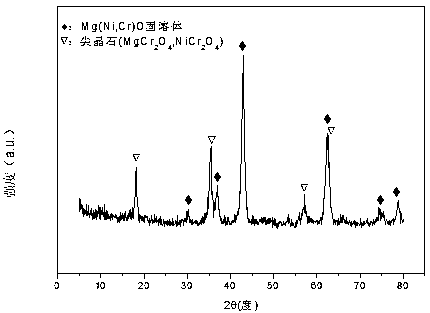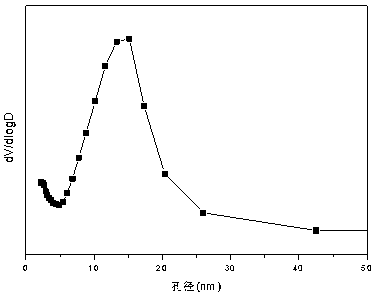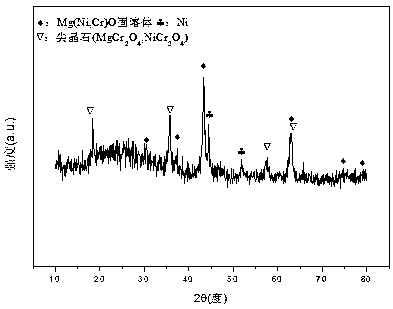Nickel-magnesium-chromium composite oxide catalyst for auto-thermal reforming of acetic acid to produce hydrogen
A composite oxide and autothermal reforming technology, applied in metal/metal oxide/metal hydroxide catalysts, physical/chemical process catalysts, heterogeneous catalyst chemical elements, etc., can solve carbon deposition and catalyst deactivation To achieve the effect of improving catalytic activity, promoting dehydrogenation process and oxidation process, and promoting gasification conversion process
- Summary
- Abstract
- Description
- Claims
- Application Information
AI Technical Summary
Problems solved by technology
Method used
Image
Examples
Embodiment 1
[0030] Weigh 8.903g Cr(NO 3 ) 3 ·9H 2 , 11.411g of Mg(NO 3 ) 2 ·6H 2 O and 2.005g of Ni(NO 3 ) 2 .6H 2 O, add 73.60 ml of deionized water to make solution #1. Weigh 9.427g NaOH and 1.610g Na 2 CO 3 , Add 250ml of deionized water to make solution #2. The subsequent steps are the same as in Reference Example 1, and a typical structure is obtained as attached figure 1 MgCr-containing 2 O 4 And NiCr 2 O 4 Spinel structure and Mg-Ni-Cr-O solid solution, as attached figure 2 The shown pore size distribution is mainly concentrated in the mesoporous composite oxide CUT-NMC-201 catalyst in the range of 10-20 nm. The weight composition of the catalyst is as follows: nickel oxide content is 14.9%, magnesium oxide is 55.1%, and chromium oxide is 30.0%.
[0031] The activity of the catalyst CUT-NMC-201 has been investigated by the autothermal reforming of acetic acid. When the reaction conditions are normal pressure, space velocity 30000ml / (g-catalyst·h), reaction temperature is 700°C, raw g...
Embodiment 2
[0033] Accurately weigh 8.566g Cr(NO 3 ) 3 ·9H 2 O, 12.484g of Mg(NO 3 ) 2 ·6H 2 O and 2.336g of Ni(NO 3 ) 2 .6H 2 O, add 75.00 ml of deionized water to make solution #1. Weigh accurately 9.681g NaOH and 1.603g Na 2 CO 3 , Add 225ml of deionized water to make solution #2. The subsequent steps are the same as in Reference Example 1, and a typical structure is obtained as attached figure 1 Shown and attached figure 2 MgCr-containing 2 O 4 And NiCr 2 O 4 The mesoporous composite oxide catalyst CUT-MNC-301 with spinel structure and Mg-Ni-Cr-O solid solution with pore size distribution concentrated in the range of 10-20nm. The weight composition of the catalyst is as follows: nickel oxide content is 14.9%, magnesium oxide is 50.1%, and chromium oxide is 35.0%.
[0034] The activity of the catalyst CUT-NMC-301 has been investigated by the autothermal reforming of acetic acid. The reaction conditions are atmospheric pressure, space velocity 30000ml / (g-catalyst·h), reaction temperature ...
PUM
| Property | Measurement | Unit |
|---|---|---|
| Specific surface area | aaaaa | aaaaa |
| Pore volume | aaaaa | aaaaa |
| Average pore size | aaaaa | aaaaa |
Abstract
Description
Claims
Application Information
 Login to View More
Login to View More - R&D
- Intellectual Property
- Life Sciences
- Materials
- Tech Scout
- Unparalleled Data Quality
- Higher Quality Content
- 60% Fewer Hallucinations
Browse by: Latest US Patents, China's latest patents, Technical Efficacy Thesaurus, Application Domain, Technology Topic, Popular Technical Reports.
© 2025 PatSnap. All rights reserved.Legal|Privacy policy|Modern Slavery Act Transparency Statement|Sitemap|About US| Contact US: help@patsnap.com



